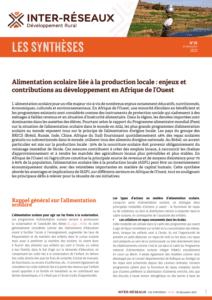Since the disengagement of the government of Senegal from agricultural value chains in the 90s, many Interprofessional Organizations (IOs) emerged, some under the impulse of the public authorities (on the rice, groundnut value chains, etc.), others were born through the initiative of the value chain actors (on the tomatoes, poultry value chains, etc.). Since 2008, the decrees of application on the agro-sylvo-pastoral orientation law (LOASP) were put in place; these forms of organization have been given a legal statute. Meanwhile, the differences between the orientations laid down in the LOASP and the operation of these organizations on the field are very big.
Producers organizations (POs) on their own part are sometimes part of these Interprofessional organizations without knowing how to properly situate themselves within them: POs are organized in different forms and they are not involved in the same manner, neither for the same objectives within the IOs. For many producers, the concept of Interprofession still remains unclear and there exist real confusion between the notion of value chain and the IO. Some producers even doubt the pertinence of IOs.
Within this context, the FONGs-Farmers Action tries to prepare producers and their POs to assume their roles within the IOs.
The FONGs proceeds first of all through the analysis of the field dynamics in order to be able to participate fully as a farmers’ organization which is working to build and strengthen IOs. This programme is built around four value chains which are considered as being strategic (rice, local cereals, groundnut, and livestock).
To better understand the various stakes related to the Interprofessions, defend the interests of the producers and POs within the commodity chains and a better consideration of family exploitations in the definition and the implementation of policies concerning the value chains are the expected results of the programme.
To realize these results, the FONGS carries out activities at different levels. On the field, some preparatory work was done to prepare and follow up the 2007-2008 farming seasons for the commodity chains retained. According to the Fongs, in order to be credible and weigh at the level of other actors of the value chain, a good mastery of agricultural production and therefore the supply, is an indispensible factor. It also relies on its network of field animators and works at the same time on training, information and lobbying. Workshops bringing together diverse actors were organized in all the six agro ecological zones of Senegal in order to take the specificities of each production zone into account and to analyze the different value chains and IOs. Some pedagogic effort on some words and concepts was done to remove some confusion. A farmers view or assessment of IOs made it possible to highlight some challenges which were further discussed during farmers’ concertations. This work resulted in the holding of a national forum which involved other producers’ organizations of the country. At last, the Fongs was strongly involved in the elaboration of the texts of application on IOs and the LOASP.
Other fundamental questions would have to be analyzed and treated : in particular the financing of structures for the regulation of value chains, the role of producers and their organizations in the management of supply, and relationships between POs and other value chain actors (and the state). For the value chains to be effective, the question of IOs would have to be completely linked to that of the organization of actors which make them up, producers’ organizations in particular (organizational capacity, respect of procedures, negotiation, construction of arguments, etc).







